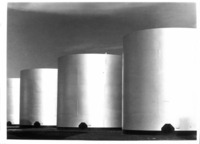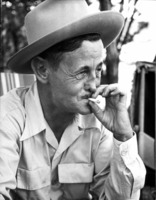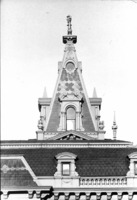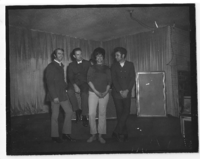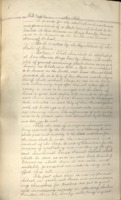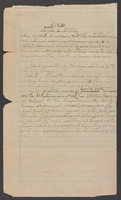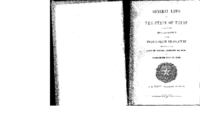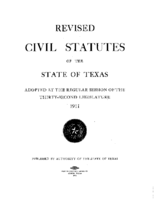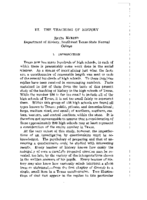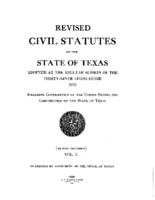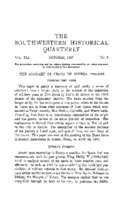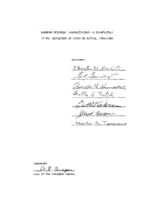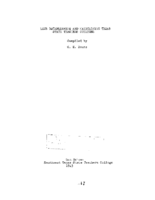Search Results
Displaying results 1 - 20 of 25
Jody Payne, Devall Hick, Kenny Smith, and an unidentified woman
Description
Jody Payne (left) posing with Devall Hick (2nd from left), Kenny Smith (right), and an unknown woman (2nd from right) on the stage of an unidentified venue
26th Legislature SB260
Description
This law established the normal school in San Marcos, now Texas State University.
Fred Cocke legislative bill drafts on establishing Southwest Texas Normal School
Description
Materials include one complete and one incomplete draft of House Bill 696 of the 26th Regular Session of the Texas Legislature (1899). The summary of the proposed bill reads: "An act to provide for establishing, governing, and maintaining a State normal school at San Marcos as to be known as the 'Southwest Texas Normal School.'" A subsequent version of this text became SB260, the legislation that officially authorized the creation of the institution now known as Texas State University.
1899-1901 General Laws of The State of Texas, Establishing the Normal School (excerpt)
Description
Select excerpts: 26th Legislature, 1899, text of S.B. No. 260, page 175: An Act to provide for ... normal school to be located at San Marcos; 27th Legislature, 1901, text of S.B. No. 142, pages 33-35: An Act to provide for the organization, control, management and active operation of the Southwest Texas State Normal School.
1911 Civil Statutes of Texas (excerpt)
Description
Excerpt. Pages 570-575 regard state teachers colleges.
The Teaching of History
Description
Paper presented in the Conference Upon Problems of Educational Administration in Texas, Austin, TX.
1925 Civil Statutes of Texas (excerpt)
Description
Excerpt. Pages 701-705 regard state teachers colleges.
The Journey of Pedro de Rivera, 1724-1728
Description
Article published in the Southwestern Historical Quarterly. This paper is partly a summary of and partly a series of selections from a longer study on the subject of the inspection of military posts in New Spain by Pedro de Rivera in the third decade of the eighteenth century. The facts selected from the longer study, for the main parts of this paper, relate to his travels in Texas and in three other provinces of New Spain which were nearest to Texas: namely, New Mexico, Coahuila, and Nuevo Leon. Preceding these facts in an introductory explanation of the origin and the general nature of his entire journey of inspection. The explanation is derived from official papers written in Madrid and the City of Mexico. The description of the selected portions of his journey is based upon, and quoted from, his own diary of that event. This paper was read at the meeting of the Texas State Historical Association in Austin, Texas, on April 24, 1937.
Spanish Presidial Administration as Exemplified by the Inspection of Pedro de Rivera, 1724-1728
Description
Retta Murphy's unpublished doctorial dissertation signed by advisors for the University of Texas. Leaves iii-iv:
"The presidio, the mission, and the town were characteristic features of Spanish imperial expansion in America. In the accumulation and preservation of official records, and consequently in the presentation of facts to historical investigators, the presidio was far less notable than either the mission or the civil settlement. In the study of the history of colonial Spanish America a great deal of interest and emphasis has centered upon the sites, the foundings, the efforts, and the significances of numerous missions, as well as upon the development or decline of some towns. Military institutions have received less emphasis, except in the narratives of campaigns and conquests. Increasing investigation of presidial affairs, however, is according a finer balance to the whole study of the Spanish American colonies. In the eighteenth century the Spanish colonial empire was usually more active in the work of maintenance than in that of expansion, and New Spain was the most important part of that empire. The military posts in northern New Spain contributed no little to the institutional life of the frontiers and to the problems of the governing officials in Madrid and in the City of Mexico. It is the purpose of this writing to portray many of these problems of military administration, as they were producing, early in the second quarter of that century, a program of reform which centered around the presidial inspection by Brigadier Don Pedro de Rivera."
"The presidio, the mission, and the town were characteristic features of Spanish imperial expansion in America. In the accumulation and preservation of official records, and consequently in the presentation of facts to historical investigators, the presidio was far less notable than either the mission or the civil settlement. In the study of the history of colonial Spanish America a great deal of interest and emphasis has centered upon the sites, the foundings, the efforts, and the significances of numerous missions, as well as upon the development or decline of some towns. Military institutions have received less emphasis, except in the narratives of campaigns and conquests. Increasing investigation of presidial affairs, however, is according a finer balance to the whole study of the Spanish American colonies. In the eighteenth century the Spanish colonial empire was usually more active in the work of maintenance than in that of expansion, and New Spain was the most important part of that empire. The military posts in northern New Spain contributed no little to the institutional life of the frontiers and to the problems of the governing officials in Madrid and in the City of Mexico. It is the purpose of this writing to portray many of these problems of military administration, as they were producing, early in the second quarter of that century, a program of reform which centered around the presidial inspection by Brigadier Don Pedro de Rivera."
Laws Establishing and Maintaining Texas State Teachers Colleges
Description
A group of laws compiled by C.E. Evans regarding the establishment and maintenance of the teachers colleges in the State of Texas.
J.M. (John Matthew) Cape oral history interview
Description
John Matthew (J.M.) Cape II (1924-2013), grandson of early San Marcos settler John Matthew Cape, was born in his family home on the banks of the San Marcos River. He joined the family cotton business, working for 43 years as a cottonseed broker. Cape discusses growing up in San Marcos, his family’s business, the history of cotton in Texas including farms, mills, and gins, the current state of cotton oil production, and some of the changes he’s witnessed in the city and the surrounding areas.
Ralph Houston oral history interview
Description
Dr. Houston talks about growing up in Denton County, attending college at UNT and teaching in Big Spring, Texas. He discusses studying for his PhD at UT-Austin and being recruited by Deacon Wright to teach at SWTSTC in the 1930s. He describes campus, the English department and its staff, and his experiences as a professor, head of the English department, and Dean of Liberal and Fine Arts during his time at the university (1937-1970). He also relates stories about Dr. McCrocklin and the university's participation in the AAUP and other academic organizations.
Bob Jr. Barton oral history interview
Description
Robert Barton describes his early life and education in the Buda and Kyle areas, specifically recalling how his cattle-driving family came to settle in Texas, attending Buda High School, and graduating from Southwest Texas State Teachers College after serving in the military during the Korean War. He discusses buying, running, and selling the Kyle News newspaper, as well as operating the Colloquium Bookstore. He speaks about the changes San Marcos and Texas politics have gone through over time, including his work with the Hays County Democratic Party. He shares his thoughts about LBJ and discusses his own run for the Texas Legislature.
Margaret Fields oral history interview
Description
Margaret Fields talks about her early life in New Braunfels and life during the Great Depression. She describes the university campus and the schooling she received at Texas State in the 1930s and 1940s. She mentions places like Old Main; people such as C.E. Evans, Mary Brogdon, Leland Derrick, and John Flowers; and her experiences living off-campus. She discusses the various teaching jobs she took in Comal County and Medina County as well as her work with the state vocational rehabilitation department in Austin and other companies in Houston. She outlines how it all led her to her current job at the Sophienburg Museum in New Braunfels.
Gus and Betty Dressen oral history interview
Description
Gus and Betty Dressen discuss their German family heritage and growing up near Uhland, Texas. Along with describing what it was like to grow up on a farm, the couple share the responsibilities that come with that kind of lifestyle, such as taking care of animals, growing corn and sugar cane, and other aspects including having a blacksmith shop. They also talk about how life back then is different from now, such as paved roads, cars, electricity, and going into town.
Margaret Carney oral history interview
Description
Margaret Carney reminisces about her life in Chilton and Waco during WWI and WWII. She reflects on her work in the USO as a hostess and director of the service club at North Camp Hood and South Camp Hood where she was paid to sing, dance, and play piano for the soldiers. Along with recalling certain popular songs, dances, and momentous events like V-E Day and V-J Day, she discusses the camps' soldiers and German POWs.
Lola Cheatham oral history interview
Description
Lola Cheatham, a long-time San Marcos resident talks about the growth of San Marcos and what Texas State used to be like. She recalls growing up and attending school in Caldwell County, going to college at Texas College in Tyler, and working for SWTSU for sixteen years. She shares her experiences and duties during her employment at the University Staff Lounge in Flowers Hall. Ms. Cheatham discusses university figures such as Emmie Craddock, John Flowers, LBJ, and Dana Smith, the university's first enrolled African-American student.
